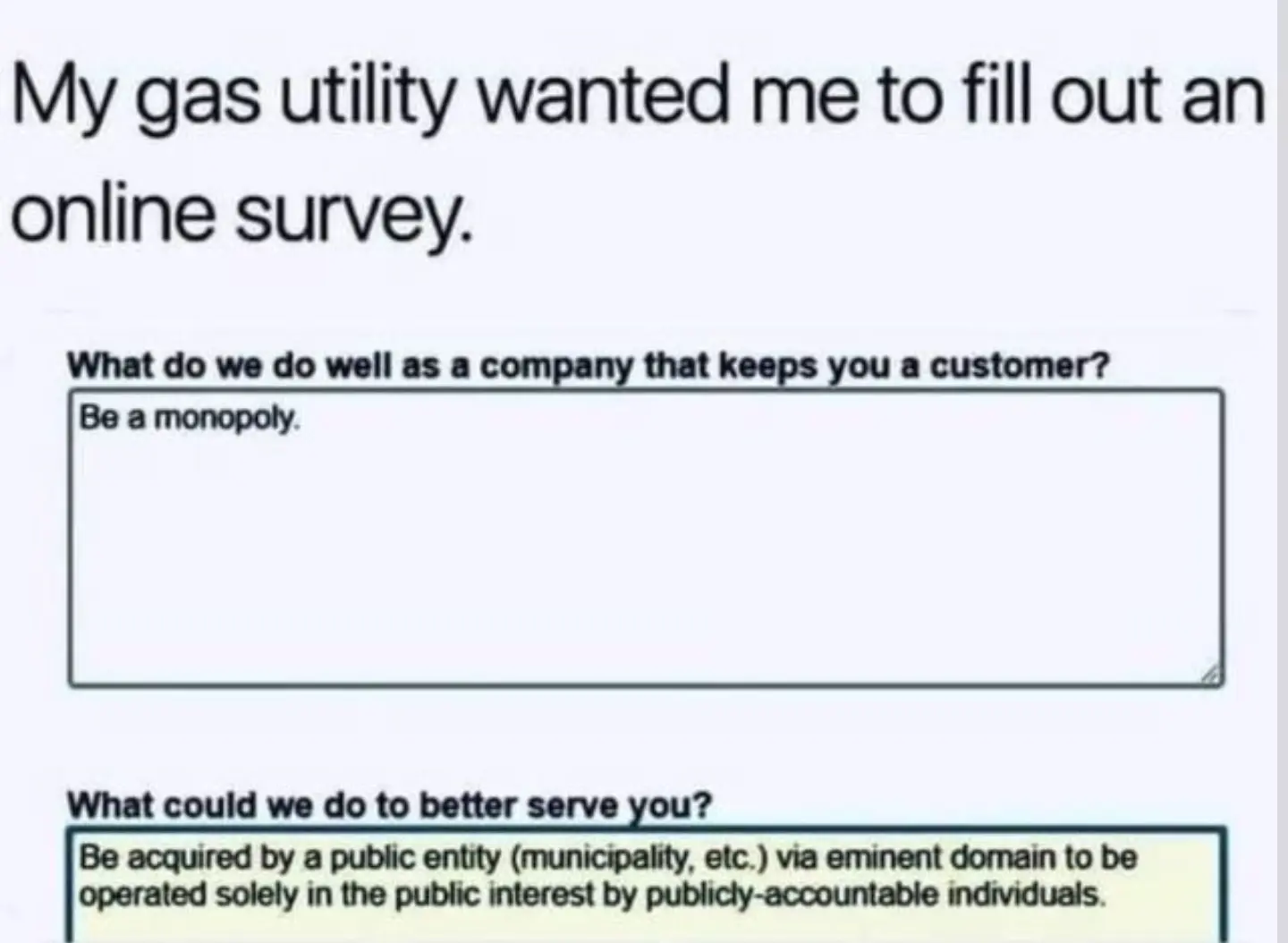this post was submitted on 10 Apr 2024
1864 points (98.6% liked)
solarpunk memes
3898 readers
222 users here now
For when you need a laugh!
The definition of a "meme" here is intentionally pretty loose. Images, screenshots, and the like are welcome!
But, keep it lighthearted and/or within our server's ideals.
Posts and comments that are hateful, trolling, inciting, and/or overly negative will be removed at the moderators' discretion.
Please follow all slrpnk.net rules and community guidelines
Have fun!
founded 3 years ago
MODERATORS
you are viewing a single comment's thread
view the rest of the comments
view the rest of the comments

Infrastructure is terrible to use as an example where competition exists.
We can't all have 6 different gas lines run to each building or even to each street to choose who to buy from. The distribution will always be common. So either that has to be installed and maintained by a municipality or a single company which then rents it out.
Competition is also predicated on the concept of low barriers to entry. If it's nearly impossible for small companies to enter the market place, there effectively never will be competition. We also have seen that money talks, that the power inequality of a big company vs small company means the large company can squeeze the small company out by economies of scale and being able to absorb larger losses until either the smaller company quits or sells to the larger company.
We can offset a lot of this by putting in strong regulations, pathways for small businesses to enter the market, create and enforce strong anti-monolopy laws, or take ownership of core infrastructure by municipalities.
You also seem to have the idea that anything state run is inefficient and corrupt, which has just been corporate propaganda. I trust USPS far more than FedEx, UPS, or any other parcel service. They run quickly, efficiently, and against some very harsh regulations which make them fully pre-fund retiree pensions.
Meanwhile FedEx consistently says I wasn't home when they tried to deliver which is highly interesting because I work from home and never leave my neighborhood on workdays. If they tried to make a delivery I'd see the truck. They just leave the "we missed you" post it without ever ringing the bell or knocking at the door
Can you think of no other ways to deliver gas than running six pipes?
When everything becomes electric, we'll have plenty of utility room to spare. Locking us into a different type of monopoly won't allow room for innovation or advancement.
The next sentence was about shared infrastructure for the pipes. That multiple gas companies could use to distribute, with the caveat that they still would need to be owned by a single entity whether that's a private company or municipality. I'd argue a municipality is the correct answer here.
If we look at electric as an analogous system, the poles and wires are always owned by a single company and then the supply can be "chosen." Even though it's just routing where your cash goes, since electricity is all pooled. The downside, is no matter how much I may not want to support the company that owns the poles and wires, I have no other option and there is no way for a competitive company to build another product to give the consumer a choice.
It's why I advocate largely for the distribution infrastructure to become public owned, paid for and maintained with taxes. I don't necessarily agree with the production of the gas/electricity/water. If the distribution infrastructure if publicly owned, then so long as a new business creates a product that matches the regulated quality they only need to pay for the permits and means to attach to the distribution network. We can lower the barrier of entry to new competitors.
The minimum standards would be set based on regulatory capture in very many municipalities. I don't think it would be worse than jank monopolies, at least. I don't know that the speed (or incentives) of either is something I trust with keeping up technologically.
Moving from a monopoly to a municipality doesn't help when the standards they set are super strict.
We've tried that. What's prone to happen is the corporations spend money to the municipalities to deregulate. Let's stop giving them the chance. It hasn't worked. Let's instead go back to treating utilities as publically beneficial
Or they spend money to make them over regulate. Yeah. If we can't even control local politicians now, how do you propose we do close that bit of fuckery?
Continuous community organization and demonstration. Systematic election reform. Solidarity
Can we do that without any masters? Do we really have to choose one?
Man you really just can't stand the idea of doing something without giving your money to venture capitalists, can you? You really think it's better that random billionaires in Silicon Valley and Jackson Hole control your power supply?
Americans are seriously ill, and need help.
I absolutely can.
Venture capitalists shouldn't exist. Our laws shouldn't insulate people from liability.
How do you suggest we run our utilities without private firms nor government firms?
What's the difference between private and government?
We want voluntary associations, yea? So we work with/in our communities. We can choose larger or smaller municipalities or companies, but we don't violate the local, voluntary bits.
Welp... In case you don't actually know, a lot....
https://www.cmich.edu/blog/all-things-higher-ed/difference-between-public-and-private-administration
Right. Our local governments. Government organizations.
Having no masters would be exactly the aim. Ultimate power should lay in the hands of the people and government should only exist to serve the will of said people. I don't fully know what that should look like but I can say for sure we've tested a lot of ideas that aren't that, and that we should try some new things because what were doing now isn't working.
We're on the same page.